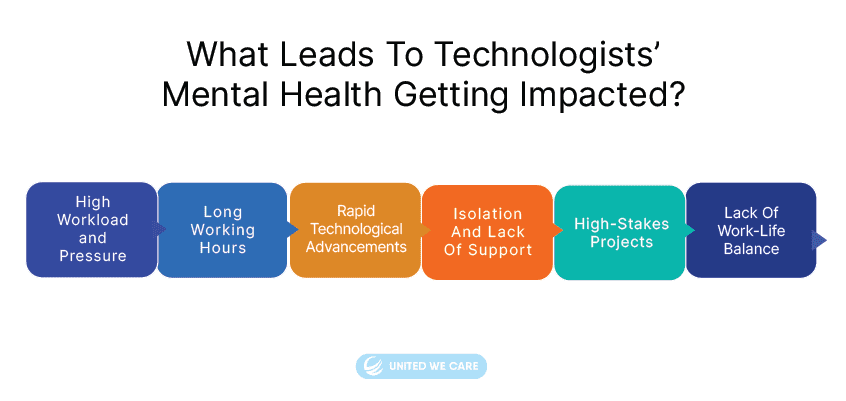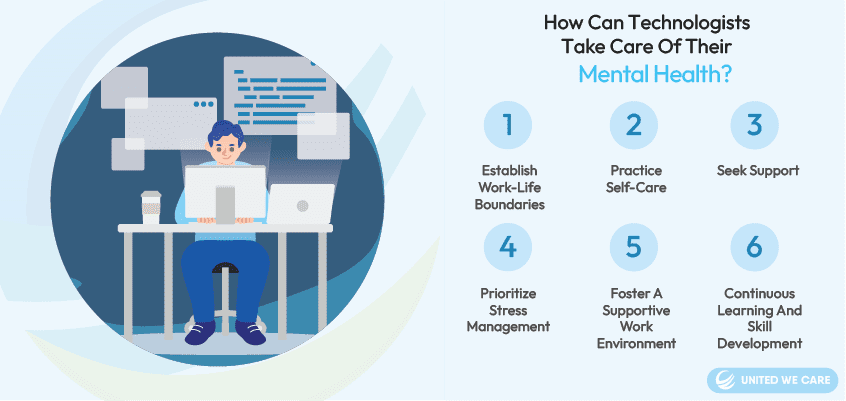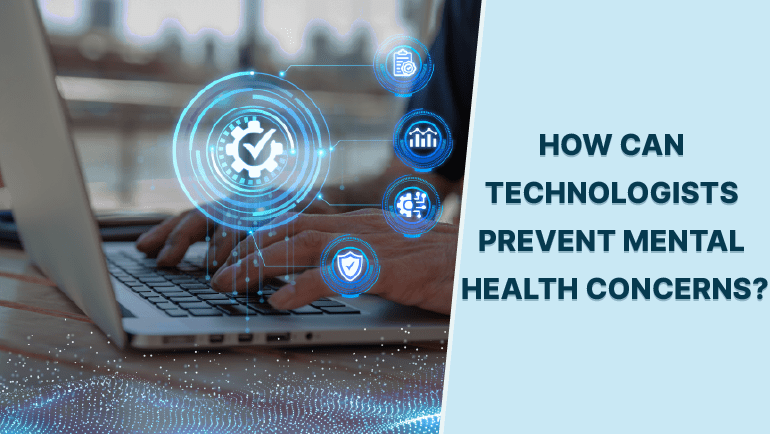Introduction
Technologists are people who help build new gadgets, innovations, and technologies. Technology surrounds our modern lives. We use different devices and innovations for all our tasks. With the advancements in technology, technologists work in high-pressure environments. The demanding nature of their work to produce better innovative ideas and long hours can cause mental health concerns. They might feel stressed, burned out, and even anxious. By addressing these concerns, promoting mental wellness, creating a supportive work environment, and advocating open conversations, technologists can get support in doing their work in the best health possible.
“It is okay to own a technology. What is not okay is to be owned by technology.” -Abhijit Naskar, Neuroscientist [1]
Who are Technologists?
Technology is everywhere. From waking up to an alarm, to using electrical equipment for exercising, cell phones, laptops, applications, and websites come to us through the advancements of technology.
It is people called technologists who are behind these advancements and innovations. They use technology for practical purposes. They know the inside out of technical systems and tools. Using this knowledge, they create and implement solutions that normal people can use in their daily activities.
There are different kinds of technologists – software developers, information technologists, engineers, and data analysts. Technologists constantly keep creating, testing, debugging, and improving technology-based solutions to improve efficiency, productivity, and creativity [2].
What Leads to Technologists’ Mental Health Getting Impacted?
Mental health issues can emerge from the smallest of triggers. However, for technologists, there are some significant factors that can be contributors [3]:

- High Workload and Pressure: These days, everything is dependent on technology. Therefore, technologists have strict deadlines and ever-increasing expectations. This kind of workload and pressure can lead to chronic stress and a constant feeling of being overwhelmed among technologists.
- Long Working Hours: Technologists have to work day and night to support the work demands. They work long hours and have to be available at any time for any glitches that may come up. They suffer from exhaustion, sleep deprivation and have no sense of work-life balance.
- Rapid Technological Advancements: The technology industry is dynamic in nature, which means that technologists have to update their skills and have specific knowledge about each and every advancement in technology. Failing to do so and the pressure of keeping up with the trends can cause anxiety and fear of falling behind.
- Isolation and Lack of Support: You might often hear technologists say that they are in love with machines. They say that because their work requires them to mostly work alone, with limited social interactions. This isolation can add to feelings of loneliness and a lack of emotional support.
- High-Stakes Projects: An entire company might sometimes run entirely using technology and software, like Amazon and Facebook. Such critical projects may come with high stakes. one mistake can lead the whole project to success or to failure. The pressure to deliver without any flaws can lead to anxiety, perfectionism, and fear of failure.
- Lack of Work-Life Balance: Critical projects, the pressure to deliver flawlessly, and the need to be available 24/7 blur the boundaries of work and personal life for technologists. Most often, they work-from-home itself, further contributing to a lack of work-life balance. They may face burnout and difficulty connecting with their friends and family.
When do Technologists Need to Take Care of Their Mental Health?
Mental health should be a priority at all times for each individual. However, for technologists, there are specific key incidents where they need to put mental health first [4]:
- High-Stress Projects or Deadlines: At the time of intense projects and strict deadlines, everyone can face stress and pressure. However, for technologists, this could mean a question of success or failure. It is in such situations that they must take care of their mental health and not push themselves beyond their capacities.
- Career Transitions or Advancements: The technology industry is ever-changing. Technologists may shift from one project to another frequently. They may also transition to new roles and take on leadership positions. Such changes and transitions can add to their plate and stress.
- Periods of Burnout or Exhaustion: Due to lack of sleep, work overload, and deadlines, technologists may feel exhausted and even burned out. They must recognize the signs of burnout- fatigue, irritation, emotional exhaustion, and lower productivity.
- Major Life Events or Personal Challenges: Challenges exist in everyone’s lives. Technologists may, too, face personal challenges or life-altering events like the death of a loved one, relationship issues, or health issues. In such cases, they must pause and take care of themselves.
How can Technologists Take Care of Their Mental Health?
Physical health and mental health are interdependent. Everyone wants to have good health. But, that is not possible without taking care of your mental health, specifically as technologists [5] [6]:

- Establish Work-Life Boundaries: Set clear boundaries between your work and personal life. Technologists should define work hours, take frequent breaks between work, and engage in hobbies or spend time with people outside work. Doing so can prevent burnout and lower stress levels.
- Practice Self-Care: Exercising regularly, eating a balanced diet, and getting sufficient sleep are part of self-care. For technologists, self-care activities are crucial. They can even consider taking up hobbies outside of work and taking time out to meet people who ease the pressures and tension and improve overall happiness.
- Seek Support: Technologists are so used to working alone. However, they must learn to take time out to meet with colleagues, friends, and family outside of workspaces. They can even discuss the challenges they might be facing, seek advice from them, and receive emotional support. Having a strong support system can be crucial to mental well-being. Additionally, technologists can seek help from trained professionals for counseling, therapy, and life coaching. United We Care is one such platform that can help them.
- Prioritize Stress Management: Stress management techniques like mindfulness, deep breathing, muscle relaxation, and meditation can help technologists in lowering stress levels, build focus and improve their ability to bounce back from any flaws or issues.
- Foster a Supportive Work Environment: With the increasing awareness about mental health issues globally, companies should also take it in their stride that their employees are well taken care of. They can even have a separate department for mental health concerns. Apart from that, they should offer flexible work hours, encourage open conversations, and insist that technologists take breaks between work.
- Continuous Learning and Skill Development: Technological world comes up with new technologies frequently. With artificial intelligence being the most significant area in the world today, technologists can take up online courses, workshops and attend conferences to keep up with the changing trends and for continuous learning. Consequently, they will be able to enhance their skills, gain confidence and job satisfaction.
Conclusion
The world of technology is constantly changing. Artificial intelligence, newer gadgets, and innovations bring limitless opportunities for technologists. However, with opportunities come challenges. High pressure, crucial deadlines, 24/7 availability, and lack of social interaction and sleep can hamper the mental health of an individual. Technologists can protect their mental well-being by prioritizing self-care, seeking support, setting work-life boundaries, and asking for a supportive work environment. Only when they address these concerns can technologists thrive and continue driving innovation in the digital age.
If you are a technologist seeking help, connect with our expert counselors or explore more content at United We Care! At United We Care, a team of wellness and mental health experts will guide you with the best methods for your well-being.
References
[1] “A quote from Mucize Insan,” Quote by Abhijit Naskar: “It is okay to own a technology, what is not oka…” https://www.goodreads.com/quotes/10858514-it-is-okay-to-own-a-technology-what-is-not
[2] “Difference Between Technician and Technologist | Difference Between,” Difference Between Technician and Technologist | Difference Between. http://www.differencebetween.net/miscellaneous/difference-between-technician-and-technologist/
[3 ] M. of Millions Foundation, “Technology and Its Effects on Mental Health in the Workplace | Made of Millions Foundation,” Made of Millions Foundation. https://www.madeofmillions.com/articles/technology-and-its-effects-on-mental-health-in-the-workplace
[4] V. Padma, N. Anand, S. M. G. S. Gurukul, S. M. A. S. M. Javid, A. Prasad, and S. Arun, “Health problems and stress in Information Technology and Business Process Outsourcing employees,” Journal of Pharmacy And Bioallied Sciences, vol. 7, no. 5, p. 9, 2015, doi: 10.4103/0975-7406.155764.
[5] Comunicaciones, “Ceiba and the fight to improve mental health in the tech industry,” Ceiba Software, Nov. 02, 2022. https://www.ceiba.com.co/en/ceiba-blog-tech/improve-mental-health-in-the-tech-industry/
[6] D. Fallon-O’Leary and D. F.-O. , Contributor, “Work-Life Integration vs. Work-Life Balance,” https://www.uschamber.com/co/, Jul. 15, 2021. https://www.uschamber.com/co/grow/thrive/work-life-integration-vs-work-life-balance




